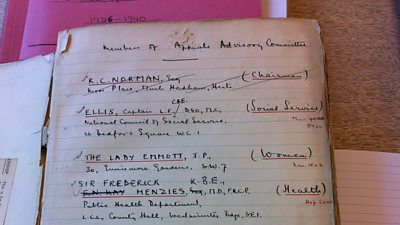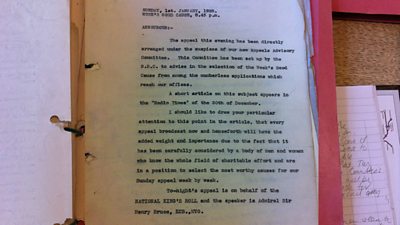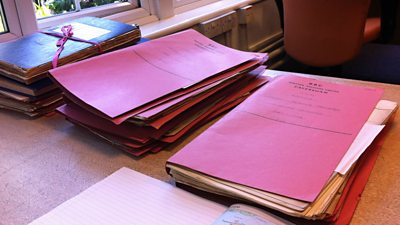The power of the microphone to help charity was fully demonstrated in 1926, when more than £25,000 was subscribed as the result of broadcast appeals.
Daily Telegraph, 25 January 1928
The ±«Óãtv broadcast appeals for charity from its very beginning. The first was on 17 February 1923, three months after broadcasting began. Ian Hay presented the appeal for the Winter Distress League, a charity representing homeless veterans of the First World War, which raised £26 6s 6d.
On-air charity appeals continued over the next few years and the ±«Óãtv was advised on which causes were appropriate for an appeal from Mr E.C. Price of the Charity Organisation Society.

The ±«Óãtv's first Charity Appeals Advisory Committee
"You don't often see the ±«Óãtv hat in hand. We provide a stand for other people’s hats every Sunday just after the evening service and we’re glad to help all the good causes we can accommodate in this way. Our listeners are most generous people."
Stuart Hibberd, ±«Óãtv Christmas Fund for Children Appeal 1927
In 1926 it was decided that the appeals should be regulated through an advisory board. The Central Appeals Advisory Committee first met on 1st December 1927. The Chairman was R.C. Norman, who later became the ±«Óãtv's Chairman. The Committee was responsible for selecting which charities would have an appeal and for the allocation of donations.
During this first meeting Lord Reith explained the need for a change to the administration of the appeals:
…the increase in public interest and in the number of applications for appeal times, the matter was becoming more complicated and that was the justification of the ±«Óãtv for asking for the assistance of such a Committee.
The first Committee was made up of prominent figures in the charity sector, all of whom had specialisms which would ensure the committee had an expert opinion on a great range of different charities which might apply for an appeal. The committee was:
- Mr R C Norman – Hospital Commission (Chairman)
- Captain L F Ellis – National Council of Social Service
- Lady Emmott – President National Council of Women
- Dr F N Kay Menzies – National Officer of Health
- Brig. Gen. RH More – United Service Fund
- Dr A H Norris – Children’s Branch ±«Óãtv Office
- Mr E Price – Charity Organisation Society
Out of this first meeting it was decided that appeals were to be broadcast two Sundays of each month from 20:45 - 20:50.
The first of these regular appeals was on Sunday 1 January 1928 and was introduced with the following announcement:
…that every appeal broadcast now and henceforth will have the added weight and importance due to the fact that it has been carefully considered by a body of men and women who know the whole field of charitable effect and are in a position to select the most worthy causes for a Sunday appeal week by week.
The appeals proved popular and even saw the ±«Óãtv setting up the "Week’s Good Cause Subscription" which allowed listeners to donate a one off sum of money to be distributed to the charities featured throughout the year. 300 listeners subscribed to this in the first year of the appeals and the ±«Óãtv placed an advert in the Radio Times to promote it further.
The appeals from 1923 - 1930 raised £203,345 6s 1d.

The Growth of Charity Appeals
Local radio stations broadcast local appeals fairly autonomously to begin with. These became more frequent in the 1930s and Regional Advisory Committees were set up in 1934.
The ±«Óãtv also gave some specific charities the status of a guaranteed annual appeal, often on a fixed day. These were the British Legion, St Martin's Fund, Queen Alexandra Rose Day and the Wireless for the Blind Fund, whose first appeal at Christmas 1928 was broadcast by Winston Churchill.
From 1930, ad-hoc appeals were more regulated and The Week's Good Cause became a regular broadcast. By this time, the ±«Óãtv had developed a policy governing the kinds of cause they could support and the nature of the broadcast. This changed during the Second World War, when appeals became concentrated on charities connected to the conflict.
The Week's Good Cause has now become The Radio 4 Appeal and is still broadcast every Sunday.
The History of Lifeline
The ±«Óãtv's television appeal Lifeline has a shorter history than the radio Charity Appeals, yet it has been broadcast for over 25 years. There have been over 300 appeals so far and more than £6m has been raised for charitable causes.
The first Lifeline appeal was in October 1986. It was presented by Selina Scott for The National Star Centre For Disabled Youth and raised over £13,000.
You can watch a clip from Lifeline's 20th anniversary programme, which includes interviews with celebrities who have presented programmes over the years and tells you more about the history of Lifeline.
